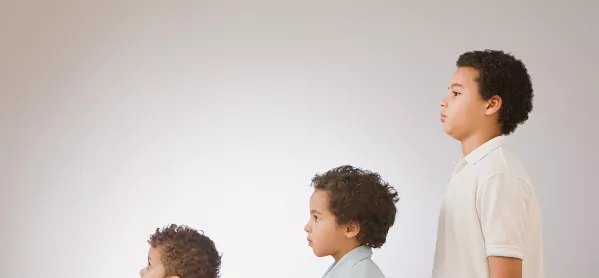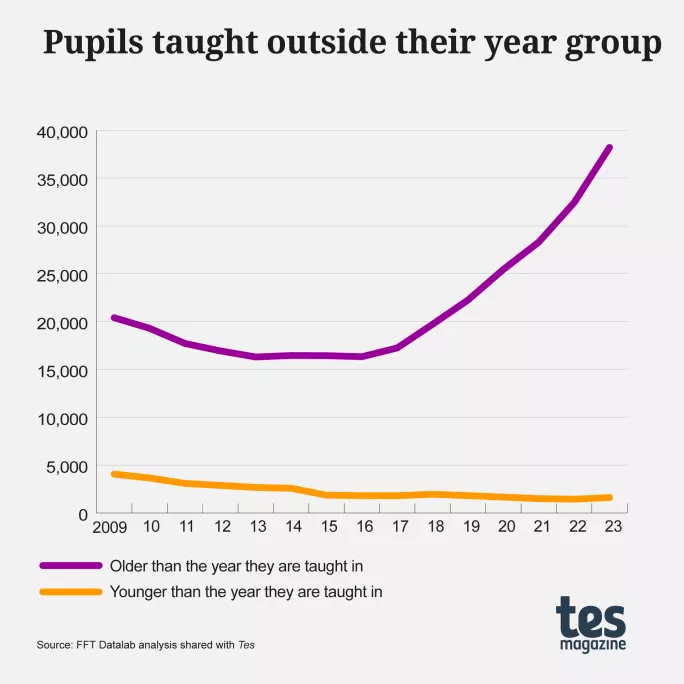Record number of pupils being taught in younger year group

The number of pupils being taught with a younger age group has more than doubled in recent years, and is now at its highest level in 15 years, analysis shows.
The number of pupils who are not being taught in the school year group you would expect given their ages has been rising both before and after the Covid-19 pandemic - with the vast majority being older than the year they are in.
The FFT Education Datalab analysis, shared with Tes, comes amid a rapid rise in the number of pupils with an education, health and care plan (EHCP), which can specify that children should be taught outside their usual age group.
The data has fuelled calls for more Department for Education guidance on how this should work.
- Analysis: Can repeating a school year be a good thing?
- Feature: Should summer-born children start school later?
- Report: Warning that summer-born children are being wrongly labelled as having SEND
Pupils who are older than the year group in which they are taught are far more likely to have been born in July or August than other pupils, and more likely to have an EHCP, according to the analysis.
FFT Datalab has looked at figures from the January school census to show how many pupils are older or younger than the year group they are being taught in.
The analysis shows that, in January 2023, almost 40,000 pupils were being taught out of year group.

This comprises around 38,000 pupils who were older than the year group expected given their age, and just under 2,000 who were younger than the year group in which they were being taught.
Taken as a percentage of the whole school population, the analysis shows an increase in the number of pupils who are older than their year group rising from 0.2 per cent in 2012 to 2017 to 0.5 per cent in 2023.
It is much more common for primary-age pupils, particularly those in Reception to Year 2, to be taught out of year group, the FFT Datalab analysis found.
In a blog post published today, FFT Datalab’s chief statistician Dave Thomson says: “The last few years have seen an increase in the number of pupils taught out of year, particularly pupils who are older than the year group in which they are taught.
“The trend in increasing numbers appears to have started before the Covid-19 pandemic. However, it has since continued to increase.”
EHCPs and summer-born pupils
The analysis shows that, in January 2023, primary pupils who are both older and younger than the age groups they were being taught in were more likely to have an EHCP plan.
Just under a third of primary pupils (31 per cent) who were older than the age group they were being taught in had an EHCP, compared with 4 per cent in their expected age group.
The proportion of primary pupils with an EHCP among those who are younger than the age group they are in is even higher, at 44 per cent.
At secondary level, 20 per cent of students who were older than the year group they were in had EHCPs compared with 5 per cent of students in their expected year groups.
Primary pupils born in July and August account for almost two-thirds of the pupils who are older than the year group they are being taught in.
The data shows that 63 per cent of the primary pupils who are older than the year group they are being taught in were born in July and August. Pupils born in these two months make up 17 per cent of pupils being taught in their expected year.
The data for summer-born children was not as striking at secondary level. Figures show 37 per cent of secondary students who are older than their year group were born in July and August.
Those born in July and August made up 17 per cent of secondary students being taught in their expected year.
James Bowen, assistant general secretary at school leaders’ union NAHT, said: “This trend is likely linked to an increasing number of parents choosing to delay when their child starts school.
“Parents of summer born children are increasingly aware of the option of requesting admission out of the normal age group and this then has a knock-on effect in future years too.”
Calls for guidance on teaching pupils with EHCPs
Government guidance says that children born from 1 April to 31 August - known as summer-born children - do not need to start school until the September after their fifth birthday, a year after they could first have started school. However, this guidance does not apply to children with an EHCP.
The DfE guidance says if a summer-born child has an EHCP and parents would like them to be admitted to school at the age of 5 to start in Reception, the local authority will need to discuss this with them.
Catriona Moore, policy manager at SEND legal charity IPSEA, said: “If a child has an EHCP, this can specify that the child should be taught outside their normal age group. It may be specified in their EHCP as special educational provision to meet their individual needs.
“Parents, schools and local authorities all need clear guidance on how this should work, and we look forward to the DfE providing this.”
The DfE indicated in October that it was planning to produce new guidance for summer-born children with EHCPs starting school.
The DfE has been contacted for comment.
You need a Tes subscription to read this article
Subscribe now to read this article and get other subscriber-only content:
- Unlimited access to all Tes magazine content
- Exclusive subscriber-only stories
- Award-winning email newsletters
Already a subscriber? Log in
You need a subscription to read this article
Subscribe now to read this article and get other subscriber-only content, including:
- Unlimited access to all Tes magazine content
- Exclusive subscriber-only stories
- Award-winning email newsletters



